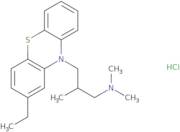Produktinformation
- 10-(3-(Dimethylamino)-2-methylpropyl)-2-ethylphenothiazine hydrochloride
- 10H-Phenothiazine-10-propanamine, 2-ethyl-N,N,beta-trimethyl-, monohydrochloride (9CI)
- 10H-Phenothiazine-10-propanamine, 2-ethyl-N,N,β-trimethyl-, hydrochloride (1:1)
- 10H-Phenothiazine-10-propanamine, 2-ethyl-N,N,β-trimethyl-, monohydrochloride
- 2-Ethyl-10-(3-dimethylamino-2-methylpropyl)phenothiazine hydrochloride
- 2-Ethyl-N,N,beta-trimethyl-10H-phenothiazine-10-propylamine monohydrochloride
- 3-(2-ethyl-10H-phenothiazin-10-yl)-N,N,2-trimethylpropan-1-amine
- Ethylisobutrazine hydrochloride
- Ethymemazine monohydrochloride
- Etymemazine HCl
- Mehr Synonyme anzeigen
- NSC 169471
- Nuital
- Phenothiazine, 10-(3-(dimethylamino)-2-methylpropyl)-2-ethyl-, monohydrochloride
- Phenothiazine, 10-[3-(dimethylamino)-2-methylpropyl]-2-ethyl-, hydrochloride
- Rp 6484
- Sergetyl
- Unii-A7002E7T2Z
Etymemazine hydrochloride is a non-steroidal compound that has immunosuppressant and anti-inflammatory effects. It is used in the treatment of viral diseases, such as hepatitis and encephalitis, as well as in inflammatory conditions such as arthritis and ophthalmic disorders. Etymemazine hydrochloride binds to the enzyme 11β-hydroxysteroid dehydrogenase type 1 (11βHSD1) and inhibits its activity. This leads to an increase in cortisol levels, which have anti-inflammatory effects. Etymemazine hydrochloride also has been found to be an effective inhibitor of prostaglandin synthesis by inhibiting cyclooxygenase 2 (COX2).





